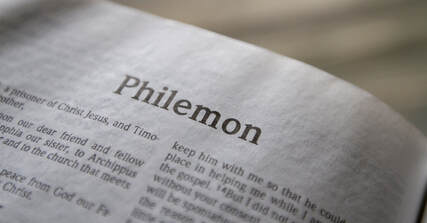
To listen to the audio of this sermon, click here.
Short and to the Point Philemon is the shortest letter by the Apostle Paul. Some may ask what is a personal letter from Paul to an individual, a letter that does not even directly deal with any doctrine, asking a man whose slave, Onesimus, has run away with stolen items, to forgive him and to receive him back as a brother in the Lord, doing in the Bible? A Prison Epistle This letter is a Prison Epistle of Paul, sent with Tychicus to Colossae because Philemon was one of the church leaders in Colossae. So along with the letter to the Colossians, went this letter to Philemon, who hosted a church meeting in his home. A Model Letter This is a model letter. It deals with a very difficult issue, it is cautious, tactful, thoughtful, inspiring, generous, polite, persuasive and has reasoned appeal. This is an example of the power of the printed page. There is much witness and discipleship that can be communicated through a letter. This is an excellent letter and a good example. This letter is also a picture of how we are saved. Paul, Philemon and Onesimus The three people in this letter are: Paul the Apostle, a prisoner in Rome, who writes to Philemon to ask him to do something very difficult. Philemon the church leader, who Paul knows and who he had led to the Lord. Onesimus, Philemon’s slave, who also came to the Lord through Paul. Paul asks him to go back to the master he had run away from, whom he had wronged and stolen from and to face up to his responsibilities. Paul said that it was difficult for him to send Onesimus away because he had become beloved and useful.
From Useless to Useful
Onesimus’ name means profitable, but he was a good for nothing. He was a criminal with a bad attitude. Philemon had stolen and fled. A slave who ran away was normally flogged and crucified. If the master was generous, he could just be branded on his face “fugitive” in Latin and would have had to bear this disfiguring mark for the rest of his life. Christian Discipleship in Action The message is a message of Christian love and forgiveness, applied Christianity, The power of the Gospel to change lives, to redeem slaves, to change hearts and minds. It is a letter that deals with a runaway slave and a thief, converted and now returning to his master. Once worthless, now valuable. From useless to useful. This book of Philemon is a magna carta of liberty. It undermined the institution of slavery, not by revolution, but by regeneration and redemption. Grace, Love and Faith “Paul, a prisoner of Christ Jesus and Timothy our brother, to Philemon our beloved friend and fellow labourer, to the beloved Apphia, Archippus our fellow soldier and to the church in your house: Grace to you and peace from God our Father and the Lord Jesus Christ. I thank my God, making mention of you always in my prayers, hearing of your love and faith which you have toward the Lord Jesus and toward all the saints, that the sharing of your faith may become effective by the acknowledgment of every good thing which is in you in Christ Jesus. For we have great joy and consolation in your love, because the hearts of the saints have been refreshed by you, brother.” Philemon 1-7 Regeneration and Redemption This letter is an appeal to his friend, a man who could justly have Onesimus flogged and branded, even put to death. He also appeals to Apphia, his wife and to Archippus, his son, or a leader of the house church. Every good thing in us is from Christ. There is nothing good in ourselves, it is the grace of God alone. Sola Gracia! Philemon is a beloved Christian leader who has brought great joy to the hearts of the saints. Slavery in the Bible This letter is not damning Philemon to hell for being a slave owner. There is slavery in the Bible. The Bible forbids kidnapping. The Bible condemns slave traders to death. The Bible, however, provides for slavery as part of a criminal justice system. So one could become a slave by getting into debt and failing to repay one’s debts. Chronic debtors were enslaved for the time it took to repay their debt. Then they were set free. Family members could redeem a slave and pay their debt for them. There was a time limit. A believing Hebrew could not be enslaved for longer than 7 years. They then had to be set free. Other Biblical requirements were that the slave owner was required to provide for the slave and his family in every way: food, accommodation, medical needs, etc. He owned their labour, he did not own their body. If a slave owner hurt a slave, the slave had to be immediately set free. Physical abuse was forbidden. How Did People Become Slaves Criminals became indentured servants, as did those who failed to repay their debts. You could also become a slave by choice. Why? Some people did not want all the responsibilities in life, so some chose to become slaves to have their food and accommodation provided, while being told what to do. They did not have to make difficult decisions. Some people are slaves to sin and vice. How much better is the Biblical criminal justice system of indentured servitude to a believing family than our present prison system, which is abusive and degrading, counterproductive and expensive for taxpayers? Restitution and Restorative Justice The Biblical system of slavery is that if somebody has stolen from you, he must repay you double, up to seven times, depending on the aggravating circumstances. How long has it been before being recovered? For example, if somebody steals your cow and it is immediately found in their possession, they must give you two cows back. If he steals your cow and you only receive your cow back a year later, you have lost a year’s worth of milk production. They then need to give you up to seven cows back. The Bible provides for restitution for the time and produce you have been deprived of. If the person does not have the means, discipline, or willingness to do proper restitution, he then could become an indentured servant, or slave. What Could Have Led Onesimus to be a Slave? The Romans conquered people in war and took many of the brightest and best back to Rome as slaves. He may have been one of these captives of war. He could also have been a criminal and been made a slave in order to pay back his debt. Paul and Philemon Paul does not rebuke Philemon for owning a slave, but considers how he treated him. In the Bible, it was more about how you treat your slaves, rather than owning slaves. Were you loving, caring, treated them like members of the family, was there mutual love and respect? Now that Onesimus was converted, it changed the whole relationship. An Appeal from the Heart “Therefore, though I might be very bold in Christ to command you what is fitting, yet for love’s sake I rather appeal to you - being such a one as Paul, the aged and now also a prisoner of Jesus Christ - I appeal to you for my son Onesimus, whom I have begotten while in my chains, who once was unprofitable to you, but now is profitable to you and to me. I am sending him back. You therefore receive him, that is, my own heart, whom I wished to keep with me, that on your behalf he might minister to me in my chains for the Gospel. But without your consent I wanted to do nothing, that your good deed might not be by compulsion, as it were, but voluntary. For perhaps he departed for a while for this purpose, that you might receive him forever, no longer as a slave but more than a slave - a beloved brother, especially to me but how much more to you, both in the flesh and in the Lord.” Philemon 8-16 Compassion Rather than Compulsion Even though Philemon had the right to have Onesimus flogged, Paul is appealing to Philemon through reason, logic and grace to receive him back as a brother in the Faith. Paul is asking him to do this out of love. This is a model of how Christianity should work. There is a huge contrast between how the world operates in compulsion and how Christianity operates in voluntary compassion. A Picture of our Salvation “If then you count me as a partner, receive him as you would me. But if he has wronged you, or owes anything, put that on my account. I, Paul, am writing with my own hand. I will repay - not to mention to you that you owe me even your own self besides.” Philemon 17-19. Paul is not operating with a whip, he is operating with wisdom and love. This is also a picture of Salvation. We are like the slave who ran away from God. We have defrauded and stolen from Him and violated His commandments. We deserve the maximum penalty. We were of no use to God, but then Jesus paid our debts. He redeemed us from slavery. He sets us free and then transformed us from useless to useful, from unprofitable to profitable. Justification and Transformation This is a picture of Justification. Just as if I had never sinned. Our debt is settled. We are made right in our standing before God. We are not just accepted as a servant, but we are received back as a son or daughter of the King. Set free to serve Christ! Justification and Sanctification. Transformed and now made useful to the Master. Knowing that You Will do Even More “Yes, brother, let me have joy from you in the Lord; refresh my heart in the Lord. Having confidence in your obedience, I write to you, knowing that you will do even more than I say. But meanwhile, also prepare a guest room for me, for I trust that through your prayers I shall be granted to you. Epaphras, my fellow prisoner in Christ Jesus, greets you, as do Mark, Aristarchus, Demas, Luke, my fellow labourers. The grace of our Lord Jesus Christ be with your spirit. Amen.” Philemon 20-25 Go the Extra Mile Jesus said, if they ask for your shirt, give them your coat as well. Go the extra mile. Do more than required. Jesus fills our cup to overflowing. Paul is expecting to be set free and he asks Philemon to prepare a room, as he will be coming to visit. He then sends greetings from fellow prisoners who also had bad pasts and then were saved by God’s grace and imprisoned for the Faith. Repentance and Restitution Onesimus did return to Philemon, willing to be a slave for life and willing to do restitution and repentance. “Exhort bondservants to be obedient to their own masters, to be well pleasing in all things, not answering back, not pilfering, but showing all good fidelity, that they may adorn the doctrine of God our Saviour in all things.” Titus 2:9-11. Mercy and Forgiveness Philemon welcomed Onesimus back without the traditional punishment for desertion and theft and He granted him liberty. Onesimus later became a Bishop of the Church in Berea. Do Not Run Away from Your Problems The message of Philemon is that we should not run away from our problems. We need to face up to our failures. We need to resolve to fulfill our duties. We need to be willing to do hard things. Jesus came to set the captives free. He has come to pronounce Release to the captives! We are commanded to forgive as we have been forgiven. To love as we have been loved. To whom much is given, much is required. To whom much more is given, much more is required. Accept others as you have been accepted. As Christ has shown you mercy, show mercy to others. Ask Yourself: What are you running away from? To what are you enslaved? What hard duty are you avoiding? Is there anyone you are indebted to? What restitution can you do? Is there anyone you need to intercede for? Can you help bring about reconciliation? Is your home an outpost for the Christian church? Do you know about the grace of God? Have you experienced peace with God? Do you have peace with God right now? Do you have great joy in Christ? Is there a letter you need to write? Is there a letter you need to respond to? Is there anyone you need to forgive? Are you effective in your work for God? Are you refreshing the saints? Dr. Peter Hammond Livingstone Fellowship P.O. Box 74 Newlands 7725 Cape Town South Africa Tel: 021-689-4480 Email: [email protected] Website: www.livingstonefellowship.co.za
0 Comments
Leave a Reply. |


 RSS Feed
RSS Feed